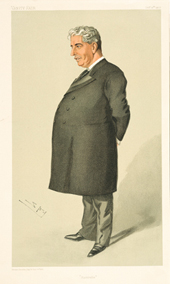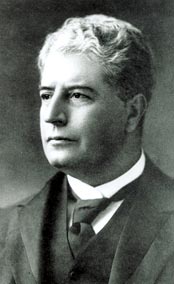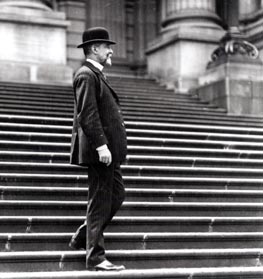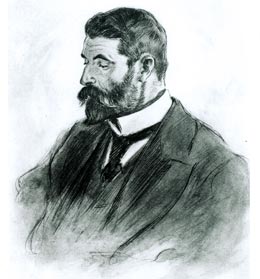Edmund Barton (1849-1920)
First Prime Minister of Australia
Edmund Barton emerged as a leader of the federation movement following the Australasian National Convention of 1891. In 1894 and 1895 he worked tirelessly to raise popular support for Federation through the formation of federal leagues. Barton was the first choice of the people of New South Wales to attend the Convention of 1897/8, where he was elected leader of the Convention, and was a member of the constitutional and drafting committees. He campaigned vigorously throughout New South Wales for a ‘yes’ vote in the referendums on the Constitution Bill. In 1900 he led an Australian delegation to London to explain the Constitution to the Imperial government.
 |
 |
Cartoon by Spry, Vanity Fair,
16 November 1902
National Library of Australia |
Edmund Barton, 1908
National Library of Australia |
Barton was Prime Minister and Minister for External Affairs from 1 January 1901 to 23 September 1903. He was commissioned by the Governor-General, Lord Hopetoun, when it became clear that Sir William Lyne, his previous choice, was unable to form a ministry, and that Barton was the man who held the loyalty and support of many who would be leaders in the new Parliament.
The member for Hunter (NSW) in the first Parliament, Barton led a team of ministers, who had all been leaders in their home states, with tact and diplomacy. Lacking a majority in the Senate, and by no means assured of one in the House of Representatives, Barton’s government nevertheless managed during the life of the first Parliament to build a legislative framework for national policy, and to establish the administrative machinery of the Commonwealth.
Barton resigned his office and his parliamentary seat in September 1903, and was appointed a judge of the High Court of Australia.
Barton’s successor as Prime Minister was his friend and supporter, Alfred Deakin.
 |
 |
Alfred Deakin
National Library of Australia |
Portrait of Alfred Deakin, drawn by Percy F. Spence;
Engraved by Lowy, Vienna, 1901
National Library of Australia |
|


